People Management Report: Strategies for High Performance at Work
VerifiedAdded on 2023/01/19
|13
|4380
|62
Report
AI Summary
This report provides a comprehensive analysis of people management strategies within Transport Malta, examining the impact of organizational structure, leadership styles, and personal differences on employee behavior and performance. It delves into the influence of centralized structures, democratic leadership, and clan culture on employee motivation and engagement. The report further explores the benefits of flexible working practices, motivational theories, and ethical practices in fostering a positive work environment and enhancing employee performance. It also covers the implementation of motivational theories, coaching, mentoring, training, and development programs. Finally, the report reviews management strategies and their impact on employees, offering recommendations for promoting high levels of performance and productivity within the organization. The report also highlights the importance of ethical practices and corporate social responsibility in motivating employees and creating a positive work environment. The report concludes with strategies to promote high levels of performance.
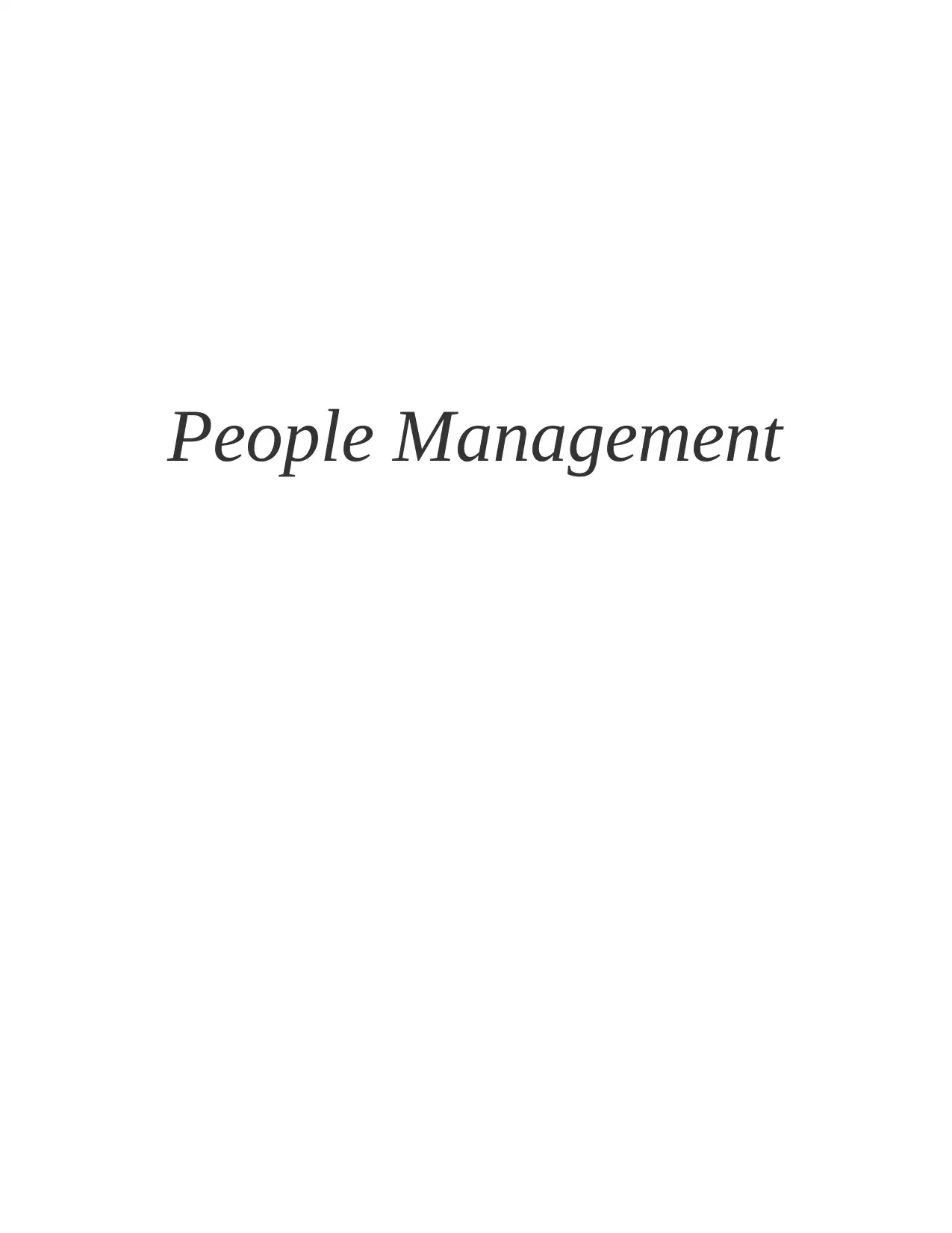
People Management
Paraphrase This Document
Need a fresh take? Get an instant paraphrase of this document with our AI Paraphraser
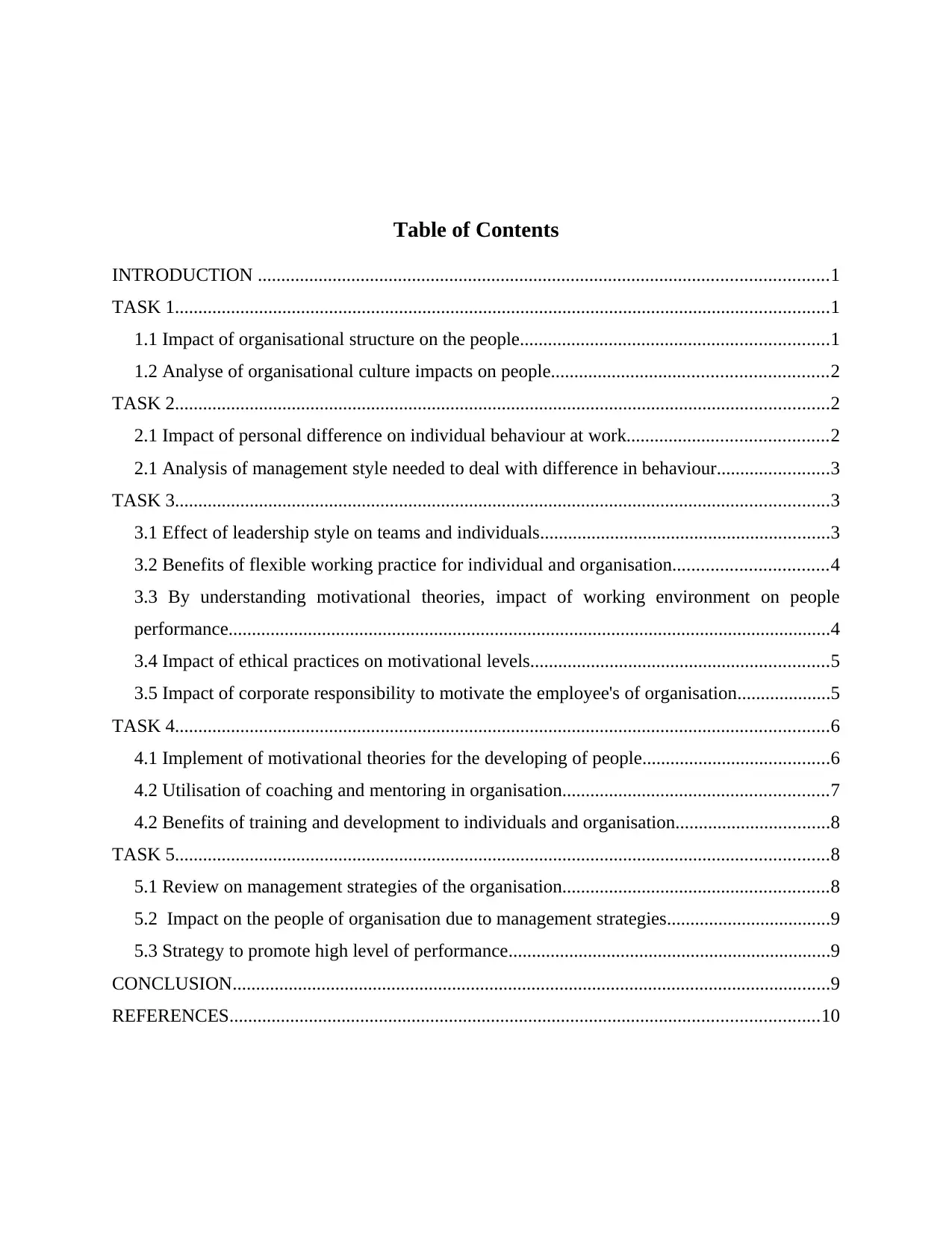
Table of Contents
INTRODUCTION ..........................................................................................................................1
TASK 1............................................................................................................................................1
1.1 Impact of organisational structure on the people..................................................................1
1.2 Analyse of organisational culture impacts on people...........................................................2
TASK 2............................................................................................................................................2
2.1 Impact of personal difference on individual behaviour at work...........................................2
2.1 Analysis of management style needed to deal with difference in behaviour........................3
TASK 3............................................................................................................................................3
3.1 Effect of leadership style on teams and individuals..............................................................3
3.2 Benefits of flexible working practice for individual and organisation.................................4
3.3 By understanding motivational theories, impact of working environment on people
performance.................................................................................................................................4
3.4 Impact of ethical practices on motivational levels................................................................5
3.5 Impact of corporate responsibility to motivate the employee's of organisation....................5
TASK 4............................................................................................................................................6
4.1 Implement of motivational theories for the developing of people........................................6
4.2 Utilisation of coaching and mentoring in organisation.........................................................7
4.2 Benefits of training and development to individuals and organisation.................................8
TASK 5............................................................................................................................................8
5.1 Review on management strategies of the organisation.........................................................8
5.2 Impact on the people of organisation due to management strategies...................................9
5.3 Strategy to promote high level of performance.....................................................................9
CONCLUSION................................................................................................................................9
REFERENCES..............................................................................................................................10
INTRODUCTION ..........................................................................................................................1
TASK 1............................................................................................................................................1
1.1 Impact of organisational structure on the people..................................................................1
1.2 Analyse of organisational culture impacts on people...........................................................2
TASK 2............................................................................................................................................2
2.1 Impact of personal difference on individual behaviour at work...........................................2
2.1 Analysis of management style needed to deal with difference in behaviour........................3
TASK 3............................................................................................................................................3
3.1 Effect of leadership style on teams and individuals..............................................................3
3.2 Benefits of flexible working practice for individual and organisation.................................4
3.3 By understanding motivational theories, impact of working environment on people
performance.................................................................................................................................4
3.4 Impact of ethical practices on motivational levels................................................................5
3.5 Impact of corporate responsibility to motivate the employee's of organisation....................5
TASK 4............................................................................................................................................6
4.1 Implement of motivational theories for the developing of people........................................6
4.2 Utilisation of coaching and mentoring in organisation.........................................................7
4.2 Benefits of training and development to individuals and organisation.................................8
TASK 5............................................................................................................................................8
5.1 Review on management strategies of the organisation.........................................................8
5.2 Impact on the people of organisation due to management strategies...................................9
5.3 Strategy to promote high level of performance.....................................................................9
CONCLUSION................................................................................................................................9
REFERENCES..............................................................................................................................10
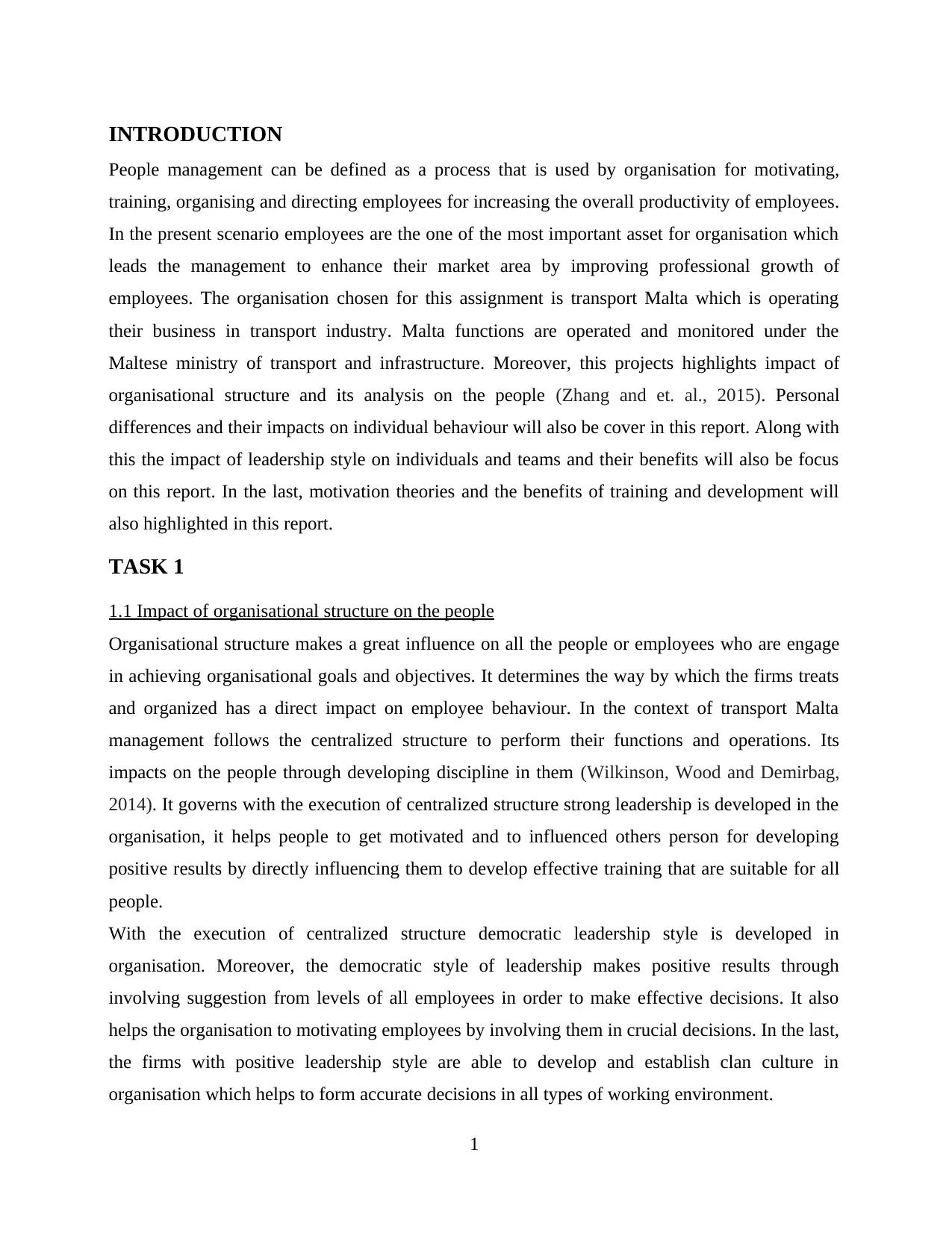
INTRODUCTION
People management can be defined as a process that is used by organisation for motivating,
training, organising and directing employees for increasing the overall productivity of employees.
In the present scenario employees are the one of the most important asset for organisation which
leads the management to enhance their market area by improving professional growth of
employees. The organisation chosen for this assignment is transport Malta which is operating
their business in transport industry. Malta functions are operated and monitored under the
Maltese ministry of transport and infrastructure. Moreover, this projects highlights impact of
organisational structure and its analysis on the people (Zhang and et. al., 2015). Personal
differences and their impacts on individual behaviour will also be cover in this report. Along with
this the impact of leadership style on individuals and teams and their benefits will also be focus
on this report. In the last, motivation theories and the benefits of training and development will
also highlighted in this report.
TASK 1
1.1 Impact of organisational structure on the people
Organisational structure makes a great influence on all the people or employees who are engage
in achieving organisational goals and objectives. It determines the way by which the firms treats
and organized has a direct impact on employee behaviour. In the context of transport Malta
management follows the centralized structure to perform their functions and operations. Its
impacts on the people through developing discipline in them (Wilkinson, Wood and Demirbag,
2014). It governs with the execution of centralized structure strong leadership is developed in the
organisation, it helps people to get motivated and to influenced others person for developing
positive results by directly influencing them to develop effective training that are suitable for all
people.
With the execution of centralized structure democratic leadership style is developed in
organisation. Moreover, the democratic style of leadership makes positive results through
involving suggestion from levels of all employees in order to make effective decisions. It also
helps the organisation to motivating employees by involving them in crucial decisions. In the last,
the firms with positive leadership style are able to develop and establish clan culture in
organisation which helps to form accurate decisions in all types of working environment.
1
People management can be defined as a process that is used by organisation for motivating,
training, organising and directing employees for increasing the overall productivity of employees.
In the present scenario employees are the one of the most important asset for organisation which
leads the management to enhance their market area by improving professional growth of
employees. The organisation chosen for this assignment is transport Malta which is operating
their business in transport industry. Malta functions are operated and monitored under the
Maltese ministry of transport and infrastructure. Moreover, this projects highlights impact of
organisational structure and its analysis on the people (Zhang and et. al., 2015). Personal
differences and their impacts on individual behaviour will also be cover in this report. Along with
this the impact of leadership style on individuals and teams and their benefits will also be focus
on this report. In the last, motivation theories and the benefits of training and development will
also highlighted in this report.
TASK 1
1.1 Impact of organisational structure on the people
Organisational structure makes a great influence on all the people or employees who are engage
in achieving organisational goals and objectives. It determines the way by which the firms treats
and organized has a direct impact on employee behaviour. In the context of transport Malta
management follows the centralized structure to perform their functions and operations. Its
impacts on the people through developing discipline in them (Wilkinson, Wood and Demirbag,
2014). It governs with the execution of centralized structure strong leadership is developed in the
organisation, it helps people to get motivated and to influenced others person for developing
positive results by directly influencing them to develop effective training that are suitable for all
people.
With the execution of centralized structure democratic leadership style is developed in
organisation. Moreover, the democratic style of leadership makes positive results through
involving suggestion from levels of all employees in order to make effective decisions. It also
helps the organisation to motivating employees by involving them in crucial decisions. In the last,
the firms with positive leadership style are able to develop and establish clan culture in
organisation which helps to form accurate decisions in all types of working environment.
1
⊘ This is a preview!⊘
Do you want full access?
Subscribe today to unlock all pages.

Trusted by 1+ million students worldwide
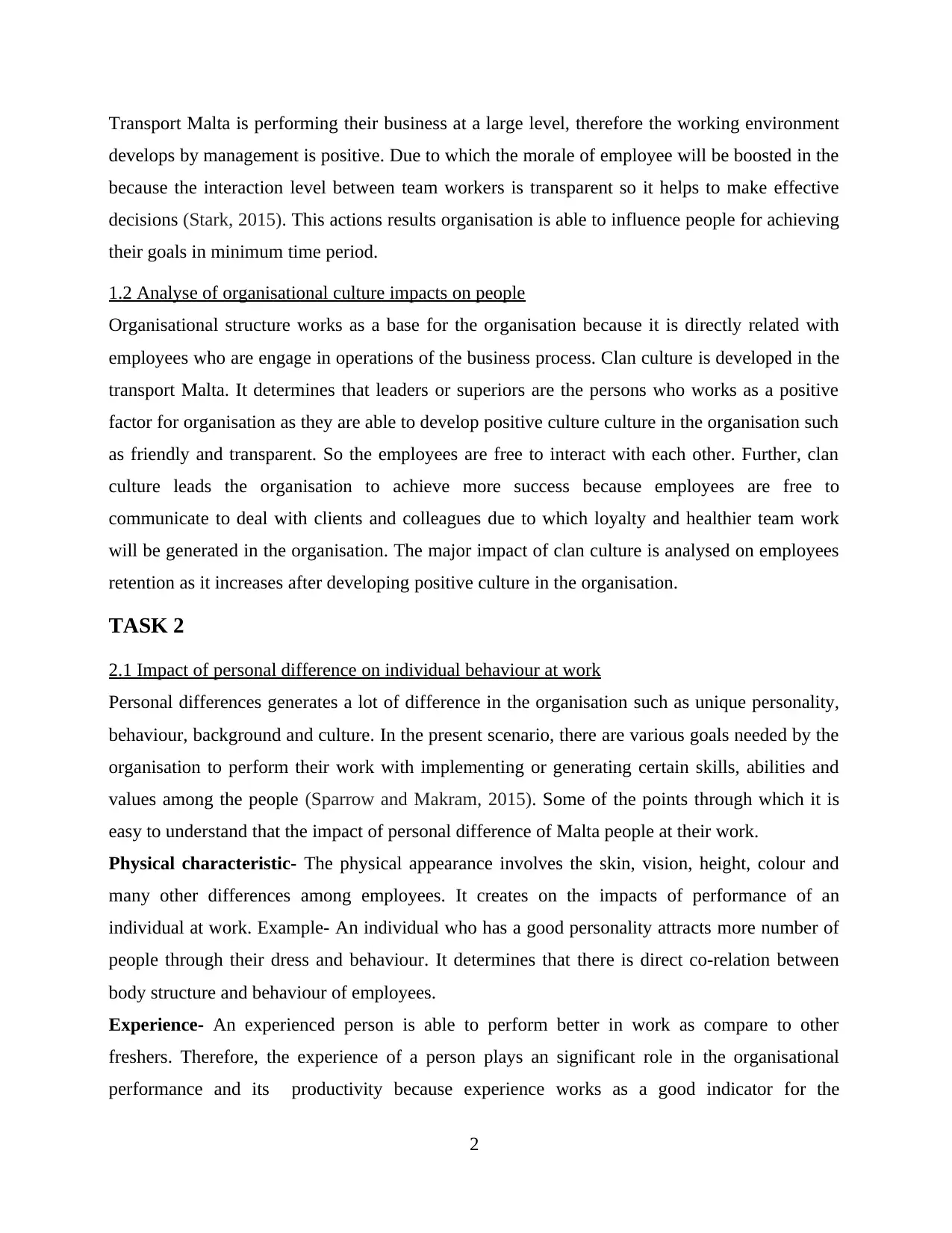
Transport Malta is performing their business at a large level, therefore the working environment
develops by management is positive. Due to which the morale of employee will be boosted in the
because the interaction level between team workers is transparent so it helps to make effective
decisions (Stark, 2015). This actions results organisation is able to influence people for achieving
their goals in minimum time period.
1.2 Analyse of organisational culture impacts on people
Organisational structure works as a base for the organisation because it is directly related with
employees who are engage in operations of the business process. Clan culture is developed in the
transport Malta. It determines that leaders or superiors are the persons who works as a positive
factor for organisation as they are able to develop positive culture culture in the organisation such
as friendly and transparent. So the employees are free to interact with each other. Further, clan
culture leads the organisation to achieve more success because employees are free to
communicate to deal with clients and colleagues due to which loyalty and healthier team work
will be generated in the organisation. The major impact of clan culture is analysed on employees
retention as it increases after developing positive culture in the organisation.
TASK 2
2.1 Impact of personal difference on individual behaviour at work
Personal differences generates a lot of difference in the organisation such as unique personality,
behaviour, background and culture. In the present scenario, there are various goals needed by the
organisation to perform their work with implementing or generating certain skills, abilities and
values among the people (Sparrow and Makram, 2015). Some of the points through which it is
easy to understand that the impact of personal difference of Malta people at their work.
Physical characteristic- The physical appearance involves the skin, vision, height, colour and
many other differences among employees. It creates on the impacts of performance of an
individual at work. Example- An individual who has a good personality attracts more number of
people through their dress and behaviour. It determines that there is direct co-relation between
body structure and behaviour of employees.
Experience- An experienced person is able to perform better in work as compare to other
freshers. Therefore, the experience of a person plays an significant role in the organisational
performance and its productivity because experience works as a good indicator for the
2
develops by management is positive. Due to which the morale of employee will be boosted in the
because the interaction level between team workers is transparent so it helps to make effective
decisions (Stark, 2015). This actions results organisation is able to influence people for achieving
their goals in minimum time period.
1.2 Analyse of organisational culture impacts on people
Organisational structure works as a base for the organisation because it is directly related with
employees who are engage in operations of the business process. Clan culture is developed in the
transport Malta. It determines that leaders or superiors are the persons who works as a positive
factor for organisation as they are able to develop positive culture culture in the organisation such
as friendly and transparent. So the employees are free to interact with each other. Further, clan
culture leads the organisation to achieve more success because employees are free to
communicate to deal with clients and colleagues due to which loyalty and healthier team work
will be generated in the organisation. The major impact of clan culture is analysed on employees
retention as it increases after developing positive culture in the organisation.
TASK 2
2.1 Impact of personal difference on individual behaviour at work
Personal differences generates a lot of difference in the organisation such as unique personality,
behaviour, background and culture. In the present scenario, there are various goals needed by the
organisation to perform their work with implementing or generating certain skills, abilities and
values among the people (Sparrow and Makram, 2015). Some of the points through which it is
easy to understand that the impact of personal difference of Malta people at their work.
Physical characteristic- The physical appearance involves the skin, vision, height, colour and
many other differences among employees. It creates on the impacts of performance of an
individual at work. Example- An individual who has a good personality attracts more number of
people through their dress and behaviour. It determines that there is direct co-relation between
body structure and behaviour of employees.
Experience- An experienced person is able to perform better in work as compare to other
freshers. Therefore, the experience of a person plays an significant role in the organisational
performance and its productivity because experience works as a good indicator for the
2
Paraphrase This Document
Need a fresh take? Get an instant paraphrase of this document with our AI Paraphraser
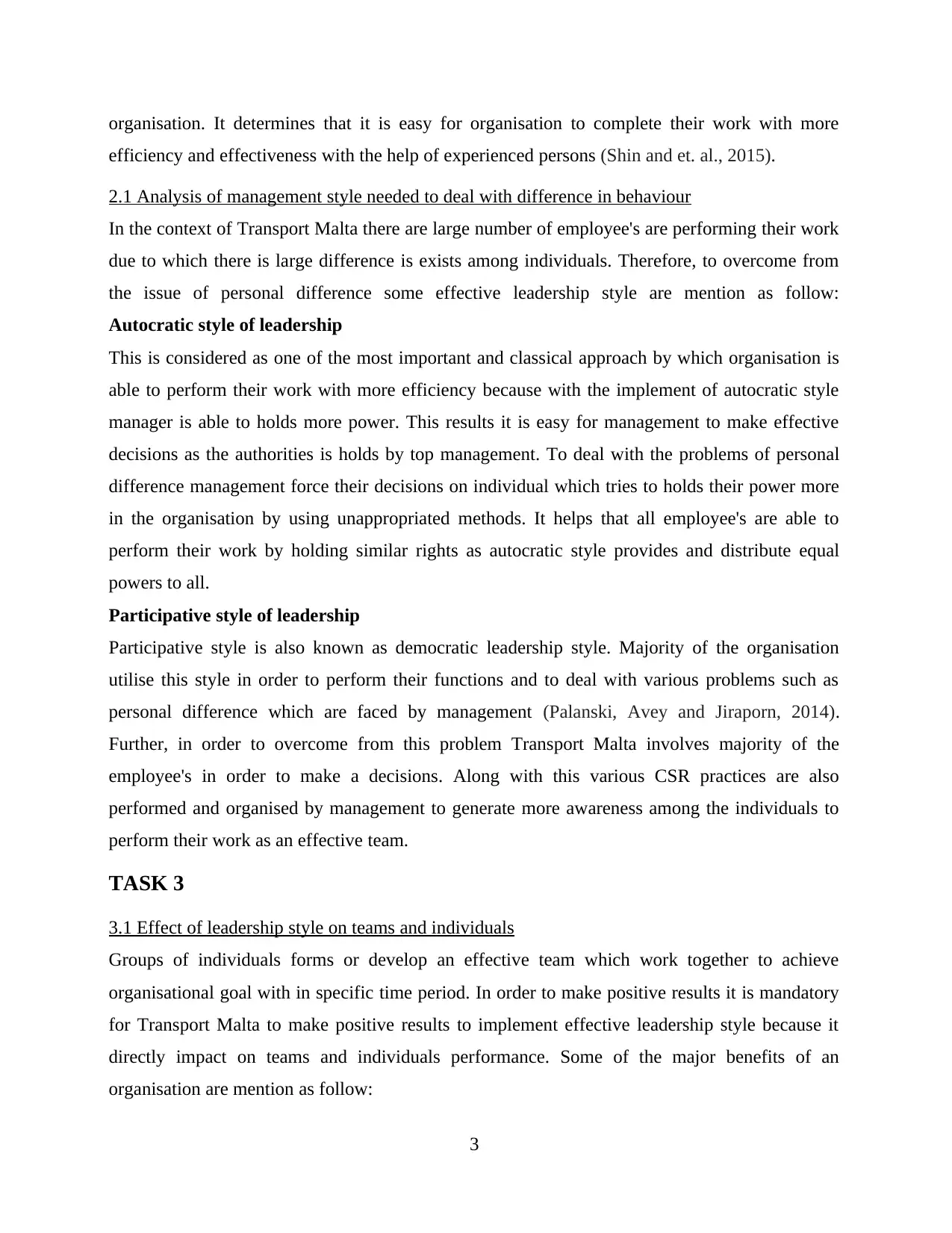
organisation. It determines that it is easy for organisation to complete their work with more
efficiency and effectiveness with the help of experienced persons (Shin and et. al., 2015).
2.1 Analysis of management style needed to deal with difference in behaviour
In the context of Transport Malta there are large number of employee's are performing their work
due to which there is large difference is exists among individuals. Therefore, to overcome from
the issue of personal difference some effective leadership style are mention as follow:
Autocratic style of leadership
This is considered as one of the most important and classical approach by which organisation is
able to perform their work with more efficiency because with the implement of autocratic style
manager is able to holds more power. This results it is easy for management to make effective
decisions as the authorities is holds by top management. To deal with the problems of personal
difference management force their decisions on individual which tries to holds their power more
in the organisation by using unappropriated methods. It helps that all employee's are able to
perform their work by holding similar rights as autocratic style provides and distribute equal
powers to all.
Participative style of leadership
Participative style is also known as democratic leadership style. Majority of the organisation
utilise this style in order to perform their functions and to deal with various problems such as
personal difference which are faced by management (Palanski, Avey and Jiraporn, 2014).
Further, in order to overcome from this problem Transport Malta involves majority of the
employee's in order to make a decisions. Along with this various CSR practices are also
performed and organised by management to generate more awareness among the individuals to
perform their work as an effective team.
TASK 3
3.1 Effect of leadership style on teams and individuals
Groups of individuals forms or develop an effective team which work together to achieve
organisational goal with in specific time period. In order to make positive results it is mandatory
for Transport Malta to make positive results to implement effective leadership style because it
directly impact on teams and individuals performance. Some of the major benefits of an
organisation are mention as follow:
3
efficiency and effectiveness with the help of experienced persons (Shin and et. al., 2015).
2.1 Analysis of management style needed to deal with difference in behaviour
In the context of Transport Malta there are large number of employee's are performing their work
due to which there is large difference is exists among individuals. Therefore, to overcome from
the issue of personal difference some effective leadership style are mention as follow:
Autocratic style of leadership
This is considered as one of the most important and classical approach by which organisation is
able to perform their work with more efficiency because with the implement of autocratic style
manager is able to holds more power. This results it is easy for management to make effective
decisions as the authorities is holds by top management. To deal with the problems of personal
difference management force their decisions on individual which tries to holds their power more
in the organisation by using unappropriated methods. It helps that all employee's are able to
perform their work by holding similar rights as autocratic style provides and distribute equal
powers to all.
Participative style of leadership
Participative style is also known as democratic leadership style. Majority of the organisation
utilise this style in order to perform their functions and to deal with various problems such as
personal difference which are faced by management (Palanski, Avey and Jiraporn, 2014).
Further, in order to overcome from this problem Transport Malta involves majority of the
employee's in order to make a decisions. Along with this various CSR practices are also
performed and organised by management to generate more awareness among the individuals to
perform their work as an effective team.
TASK 3
3.1 Effect of leadership style on teams and individuals
Groups of individuals forms or develop an effective team which work together to achieve
organisational goal with in specific time period. In order to make positive results it is mandatory
for Transport Malta to make positive results to implement effective leadership style because it
directly impact on teams and individuals performance. Some of the major benefits of an
organisation are mention as follow:
3
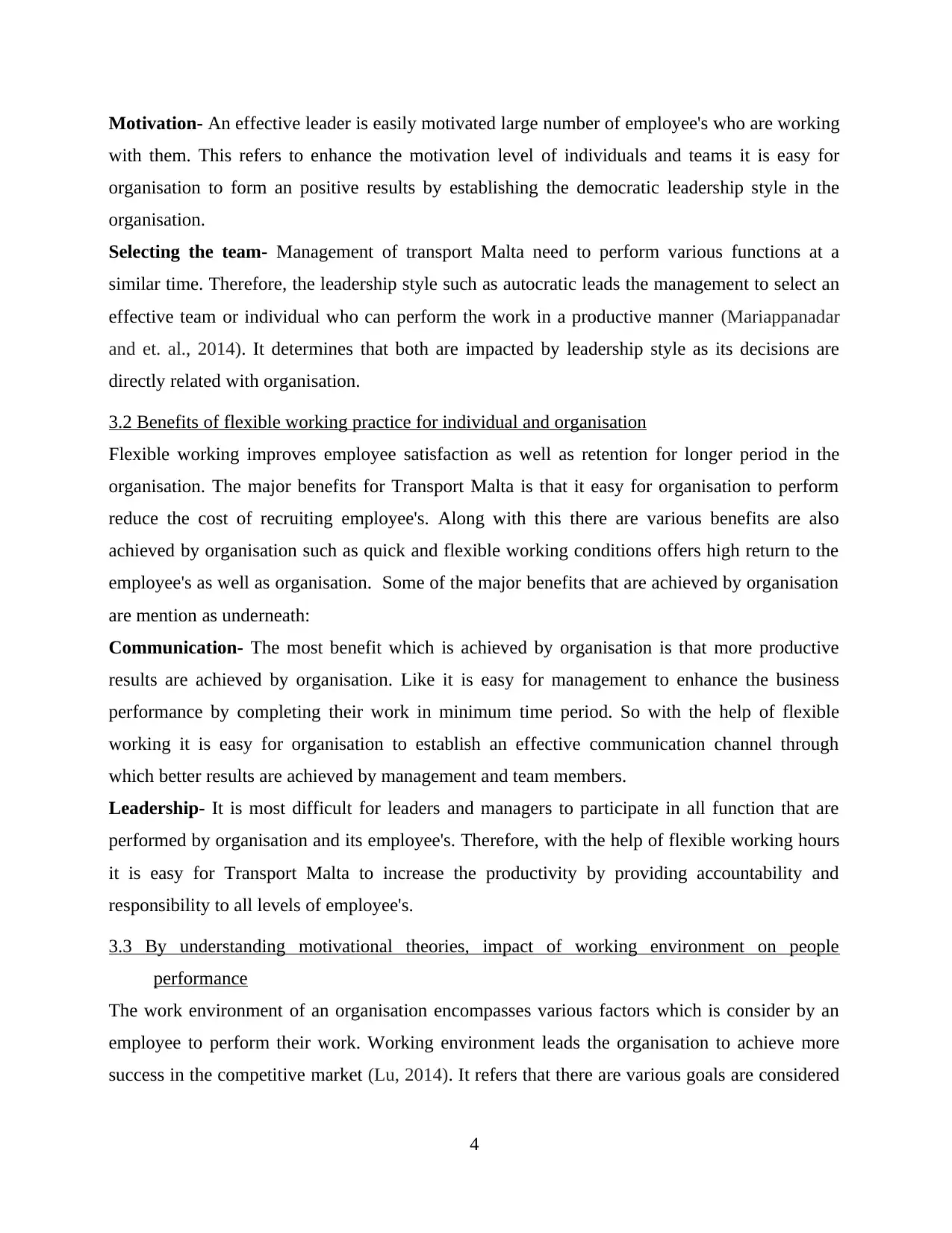
Motivation- An effective leader is easily motivated large number of employee's who are working
with them. This refers to enhance the motivation level of individuals and teams it is easy for
organisation to form an positive results by establishing the democratic leadership style in the
organisation.
Selecting the team- Management of transport Malta need to perform various functions at a
similar time. Therefore, the leadership style such as autocratic leads the management to select an
effective team or individual who can perform the work in a productive manner (Mariappanadar
and et. al., 2014). It determines that both are impacted by leadership style as its decisions are
directly related with organisation.
3.2 Benefits of flexible working practice for individual and organisation
Flexible working improves employee satisfaction as well as retention for longer period in the
organisation. The major benefits for Transport Malta is that it easy for organisation to perform
reduce the cost of recruiting employee's. Along with this there are various benefits are also
achieved by organisation such as quick and flexible working conditions offers high return to the
employee's as well as organisation. Some of the major benefits that are achieved by organisation
are mention as underneath:
Communication- The most benefit which is achieved by organisation is that more productive
results are achieved by organisation. Like it is easy for management to enhance the business
performance by completing their work in minimum time period. So with the help of flexible
working it is easy for organisation to establish an effective communication channel through
which better results are achieved by management and team members.
Leadership- It is most difficult for leaders and managers to participate in all function that are
performed by organisation and its employee's. Therefore, with the help of flexible working hours
it is easy for Transport Malta to increase the productivity by providing accountability and
responsibility to all levels of employee's.
3.3 By understanding motivational theories, impact of working environment on people
performance
The work environment of an organisation encompasses various factors which is consider by an
employee to perform their work. Working environment leads the organisation to achieve more
success in the competitive market (Lu, 2014). It refers that there are various goals are considered
4
with them. This refers to enhance the motivation level of individuals and teams it is easy for
organisation to form an positive results by establishing the democratic leadership style in the
organisation.
Selecting the team- Management of transport Malta need to perform various functions at a
similar time. Therefore, the leadership style such as autocratic leads the management to select an
effective team or individual who can perform the work in a productive manner (Mariappanadar
and et. al., 2014). It determines that both are impacted by leadership style as its decisions are
directly related with organisation.
3.2 Benefits of flexible working practice for individual and organisation
Flexible working improves employee satisfaction as well as retention for longer period in the
organisation. The major benefits for Transport Malta is that it easy for organisation to perform
reduce the cost of recruiting employee's. Along with this there are various benefits are also
achieved by organisation such as quick and flexible working conditions offers high return to the
employee's as well as organisation. Some of the major benefits that are achieved by organisation
are mention as underneath:
Communication- The most benefit which is achieved by organisation is that more productive
results are achieved by organisation. Like it is easy for management to enhance the business
performance by completing their work in minimum time period. So with the help of flexible
working it is easy for organisation to establish an effective communication channel through
which better results are achieved by management and team members.
Leadership- It is most difficult for leaders and managers to participate in all function that are
performed by organisation and its employee's. Therefore, with the help of flexible working hours
it is easy for Transport Malta to increase the productivity by providing accountability and
responsibility to all levels of employee's.
3.3 By understanding motivational theories, impact of working environment on people
performance
The work environment of an organisation encompasses various factors which is consider by an
employee to perform their work. Working environment leads the organisation to achieve more
success in the competitive market (Lu, 2014). It refers that there are various goals are considered
4
⊘ This is a preview!⊘
Do you want full access?
Subscribe today to unlock all pages.

Trusted by 1+ million students worldwide
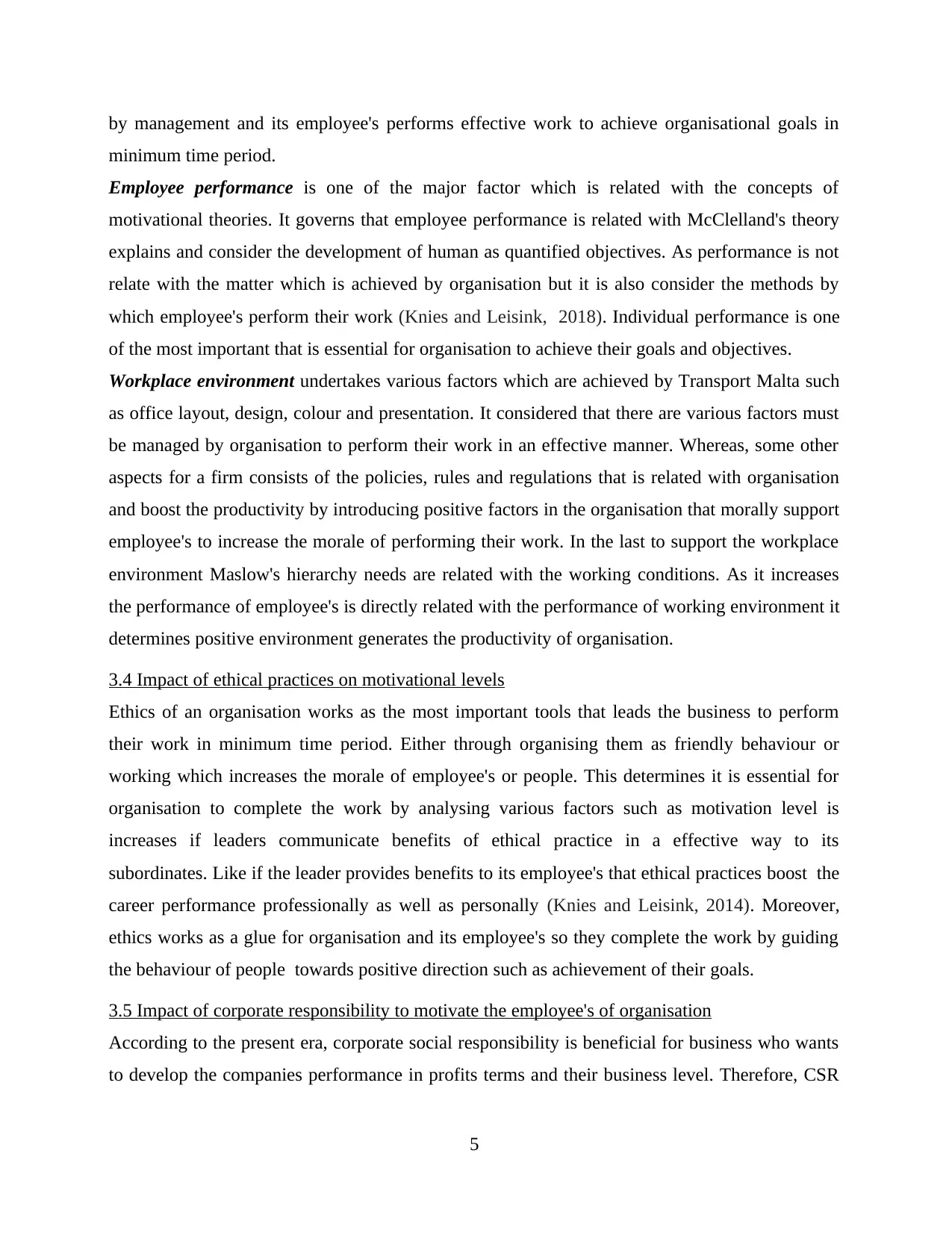
by management and its employee's performs effective work to achieve organisational goals in
minimum time period.
Employee performance is one of the major factor which is related with the concepts of
motivational theories. It governs that employee performance is related with McClelland's theory
explains and consider the development of human as quantified objectives. As performance is not
relate with the matter which is achieved by organisation but it is also consider the methods by
which employee's perform their work (Knies and Leisink, 2018). Individual performance is one
of the most important that is essential for organisation to achieve their goals and objectives.
Workplace environment undertakes various factors which are achieved by Transport Malta such
as office layout, design, colour and presentation. It considered that there are various factors must
be managed by organisation to perform their work in an effective manner. Whereas, some other
aspects for a firm consists of the policies, rules and regulations that is related with organisation
and boost the productivity by introducing positive factors in the organisation that morally support
employee's to increase the morale of performing their work. In the last to support the workplace
environment Maslow's hierarchy needs are related with the working conditions. As it increases
the performance of employee's is directly related with the performance of working environment it
determines positive environment generates the productivity of organisation.
3.4 Impact of ethical practices on motivational levels
Ethics of an organisation works as the most important tools that leads the business to perform
their work in minimum time period. Either through organising them as friendly behaviour or
working which increases the morale of employee's or people. This determines it is essential for
organisation to complete the work by analysing various factors such as motivation level is
increases if leaders communicate benefits of ethical practice in a effective way to its
subordinates. Like if the leader provides benefits to its employee's that ethical practices boost the
career performance professionally as well as personally (Knies and Leisink, 2014). Moreover,
ethics works as a glue for organisation and its employee's so they complete the work by guiding
the behaviour of people towards positive direction such as achievement of their goals.
3.5 Impact of corporate responsibility to motivate the employee's of organisation
According to the present era, corporate social responsibility is beneficial for business who wants
to develop the companies performance in profits terms and their business level. Therefore, CSR
5
minimum time period.
Employee performance is one of the major factor which is related with the concepts of
motivational theories. It governs that employee performance is related with McClelland's theory
explains and consider the development of human as quantified objectives. As performance is not
relate with the matter which is achieved by organisation but it is also consider the methods by
which employee's perform their work (Knies and Leisink, 2018). Individual performance is one
of the most important that is essential for organisation to achieve their goals and objectives.
Workplace environment undertakes various factors which are achieved by Transport Malta such
as office layout, design, colour and presentation. It considered that there are various factors must
be managed by organisation to perform their work in an effective manner. Whereas, some other
aspects for a firm consists of the policies, rules and regulations that is related with organisation
and boost the productivity by introducing positive factors in the organisation that morally support
employee's to increase the morale of performing their work. In the last to support the workplace
environment Maslow's hierarchy needs are related with the working conditions. As it increases
the performance of employee's is directly related with the performance of working environment it
determines positive environment generates the productivity of organisation.
3.4 Impact of ethical practices on motivational levels
Ethics of an organisation works as the most important tools that leads the business to perform
their work in minimum time period. Either through organising them as friendly behaviour or
working which increases the morale of employee's or people. This determines it is essential for
organisation to complete the work by analysing various factors such as motivation level is
increases if leaders communicate benefits of ethical practice in a effective way to its
subordinates. Like if the leader provides benefits to its employee's that ethical practices boost the
career performance professionally as well as personally (Knies and Leisink, 2014). Moreover,
ethics works as a glue for organisation and its employee's so they complete the work by guiding
the behaviour of people towards positive direction such as achievement of their goals.
3.5 Impact of corporate responsibility to motivate the employee's of organisation
According to the present era, corporate social responsibility is beneficial for business who wants
to develop the companies performance in profits terms and their business level. Therefore, CSR
5
Paraphrase This Document
Need a fresh take? Get an instant paraphrase of this document with our AI Paraphraser
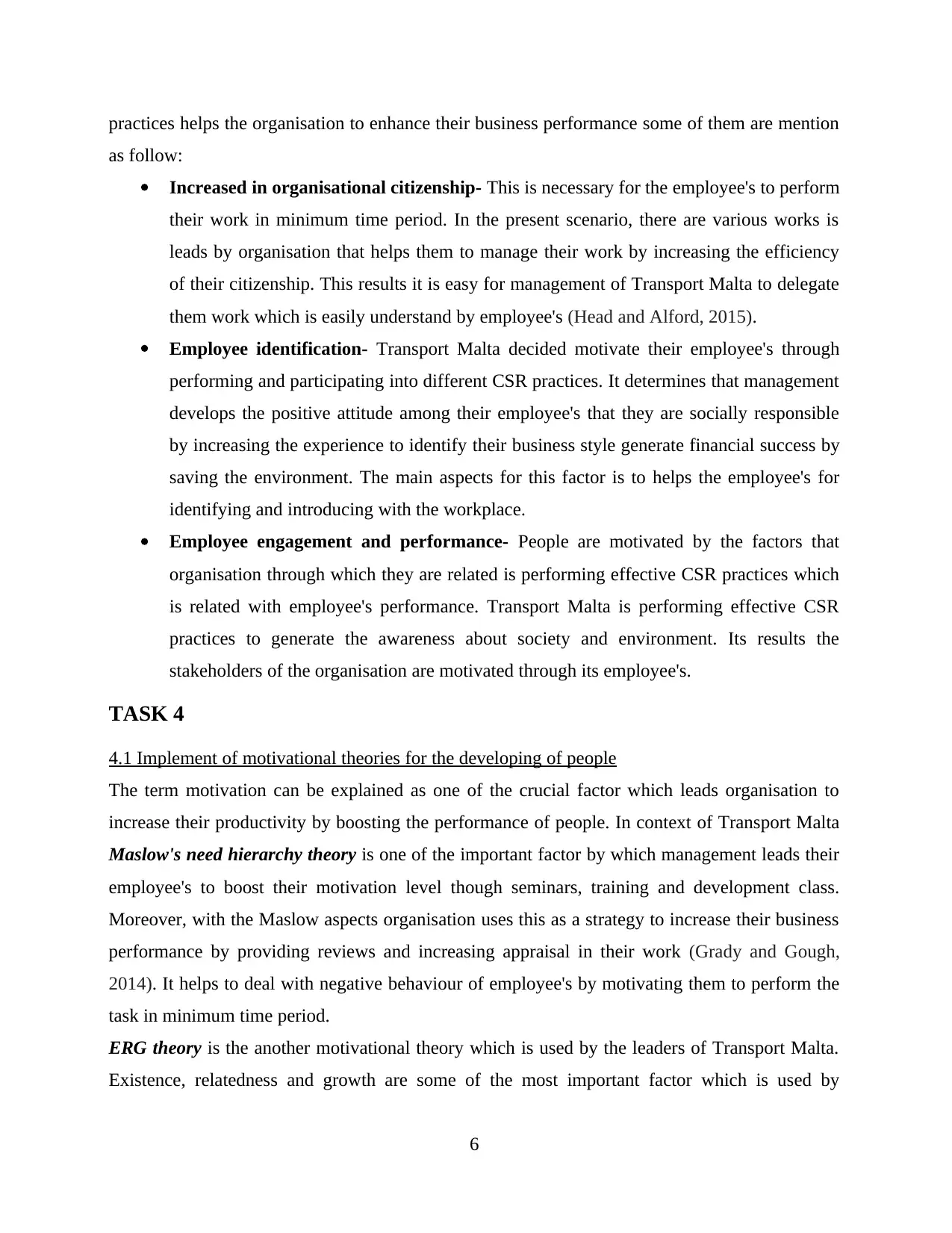
practices helps the organisation to enhance their business performance some of them are mention
as follow:
Increased in organisational citizenship- This is necessary for the employee's to perform
their work in minimum time period. In the present scenario, there are various works is
leads by organisation that helps them to manage their work by increasing the efficiency
of their citizenship. This results it is easy for management of Transport Malta to delegate
them work which is easily understand by employee's (Head and Alford, 2015).
Employee identification- Transport Malta decided motivate their employee's through
performing and participating into different CSR practices. It determines that management
develops the positive attitude among their employee's that they are socially responsible
by increasing the experience to identify their business style generate financial success by
saving the environment. The main aspects for this factor is to helps the employee's for
identifying and introducing with the workplace.
Employee engagement and performance- People are motivated by the factors that
organisation through which they are related is performing effective CSR practices which
is related with employee's performance. Transport Malta is performing effective CSR
practices to generate the awareness about society and environment. Its results the
stakeholders of the organisation are motivated through its employee's.
TASK 4
4.1 Implement of motivational theories for the developing of people
The term motivation can be explained as one of the crucial factor which leads organisation to
increase their productivity by boosting the performance of people. In context of Transport Malta
Maslow's need hierarchy theory is one of the important factor by which management leads their
employee's to boost their motivation level though seminars, training and development class.
Moreover, with the Maslow aspects organisation uses this as a strategy to increase their business
performance by providing reviews and increasing appraisal in their work (Grady and Gough,
2014). It helps to deal with negative behaviour of employee's by motivating them to perform the
task in minimum time period.
ERG theory is the another motivational theory which is used by the leaders of Transport Malta.
Existence, relatedness and growth are some of the most important factor which is used by
6
as follow:
Increased in organisational citizenship- This is necessary for the employee's to perform
their work in minimum time period. In the present scenario, there are various works is
leads by organisation that helps them to manage their work by increasing the efficiency
of their citizenship. This results it is easy for management of Transport Malta to delegate
them work which is easily understand by employee's (Head and Alford, 2015).
Employee identification- Transport Malta decided motivate their employee's through
performing and participating into different CSR practices. It determines that management
develops the positive attitude among their employee's that they are socially responsible
by increasing the experience to identify their business style generate financial success by
saving the environment. The main aspects for this factor is to helps the employee's for
identifying and introducing with the workplace.
Employee engagement and performance- People are motivated by the factors that
organisation through which they are related is performing effective CSR practices which
is related with employee's performance. Transport Malta is performing effective CSR
practices to generate the awareness about society and environment. Its results the
stakeholders of the organisation are motivated through its employee's.
TASK 4
4.1 Implement of motivational theories for the developing of people
The term motivation can be explained as one of the crucial factor which leads organisation to
increase their productivity by boosting the performance of people. In context of Transport Malta
Maslow's need hierarchy theory is one of the important factor by which management leads their
employee's to boost their motivation level though seminars, training and development class.
Moreover, with the Maslow aspects organisation uses this as a strategy to increase their business
performance by providing reviews and increasing appraisal in their work (Grady and Gough,
2014). It helps to deal with negative behaviour of employee's by motivating them to perform the
task in minimum time period.
ERG theory is the another motivational theory which is used by the leaders of Transport Malta.
Existence, relatedness and growth are some of the most important factor which is used by
6
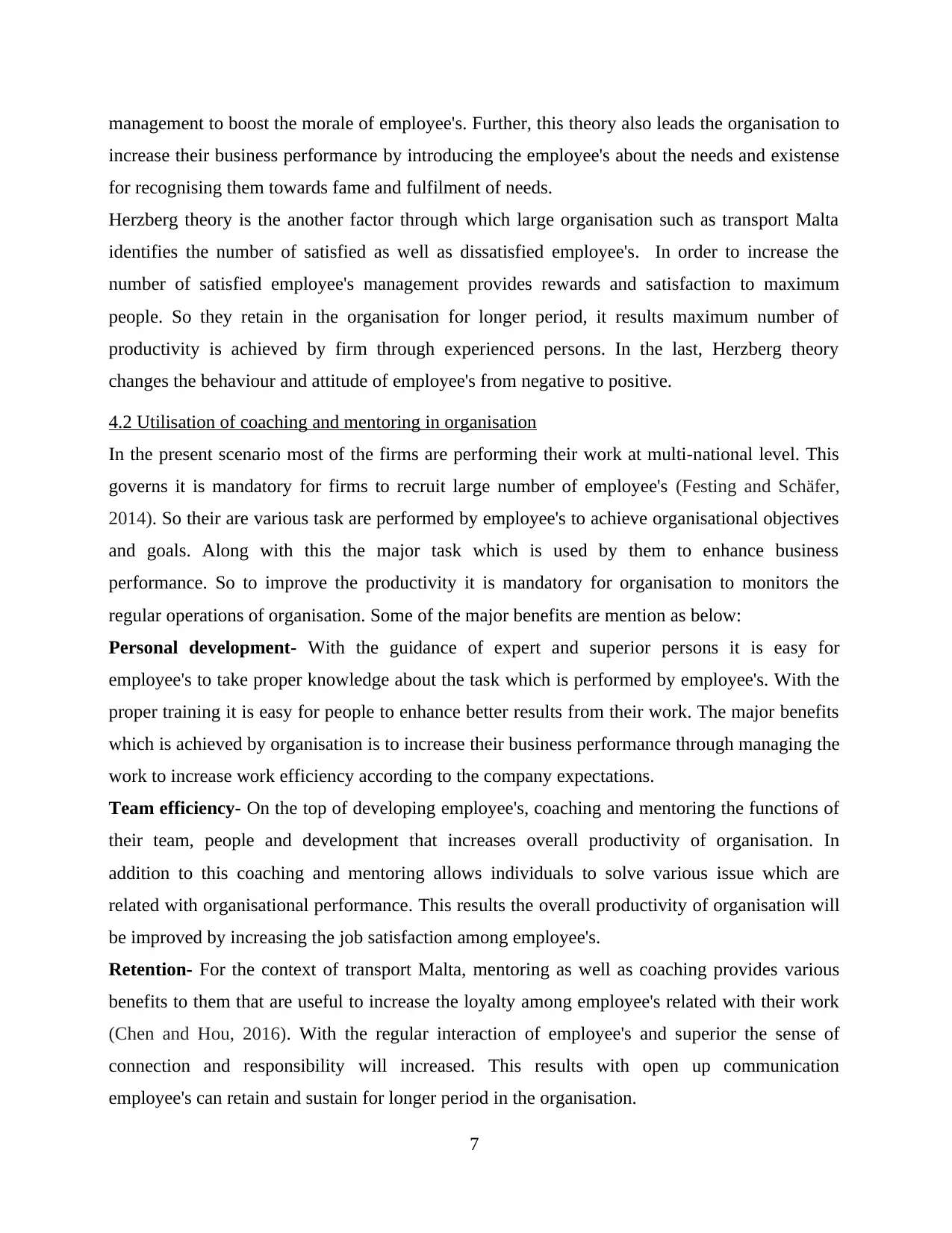
management to boost the morale of employee's. Further, this theory also leads the organisation to
increase their business performance by introducing the employee's about the needs and existense
for recognising them towards fame and fulfilment of needs.
Herzberg theory is the another factor through which large organisation such as transport Malta
identifies the number of satisfied as well as dissatisfied employee's. In order to increase the
number of satisfied employee's management provides rewards and satisfaction to maximum
people. So they retain in the organisation for longer period, it results maximum number of
productivity is achieved by firm through experienced persons. In the last, Herzberg theory
changes the behaviour and attitude of employee's from negative to positive.
4.2 Utilisation of coaching and mentoring in organisation
In the present scenario most of the firms are performing their work at multi-national level. This
governs it is mandatory for firms to recruit large number of employee's (Festing and Schäfer,
2014). So their are various task are performed by employee's to achieve organisational objectives
and goals. Along with this the major task which is used by them to enhance business
performance. So to improve the productivity it is mandatory for organisation to monitors the
regular operations of organisation. Some of the major benefits are mention as below:
Personal development- With the guidance of expert and superior persons it is easy for
employee's to take proper knowledge about the task which is performed by employee's. With the
proper training it is easy for people to enhance better results from their work. The major benefits
which is achieved by organisation is to increase their business performance through managing the
work to increase work efficiency according to the company expectations.
Team efficiency- On the top of developing employee's, coaching and mentoring the functions of
their team, people and development that increases overall productivity of organisation. In
addition to this coaching and mentoring allows individuals to solve various issue which are
related with organisational performance. This results the overall productivity of organisation will
be improved by increasing the job satisfaction among employee's.
Retention- For the context of transport Malta, mentoring as well as coaching provides various
benefits to them that are useful to increase the loyalty among employee's related with their work
(Chen and Hou, 2016). With the regular interaction of employee's and superior the sense of
connection and responsibility will increased. This results with open up communication
employee's can retain and sustain for longer period in the organisation.
7
increase their business performance by introducing the employee's about the needs and existense
for recognising them towards fame and fulfilment of needs.
Herzberg theory is the another factor through which large organisation such as transport Malta
identifies the number of satisfied as well as dissatisfied employee's. In order to increase the
number of satisfied employee's management provides rewards and satisfaction to maximum
people. So they retain in the organisation for longer period, it results maximum number of
productivity is achieved by firm through experienced persons. In the last, Herzberg theory
changes the behaviour and attitude of employee's from negative to positive.
4.2 Utilisation of coaching and mentoring in organisation
In the present scenario most of the firms are performing their work at multi-national level. This
governs it is mandatory for firms to recruit large number of employee's (Festing and Schäfer,
2014). So their are various task are performed by employee's to achieve organisational objectives
and goals. Along with this the major task which is used by them to enhance business
performance. So to improve the productivity it is mandatory for organisation to monitors the
regular operations of organisation. Some of the major benefits are mention as below:
Personal development- With the guidance of expert and superior persons it is easy for
employee's to take proper knowledge about the task which is performed by employee's. With the
proper training it is easy for people to enhance better results from their work. The major benefits
which is achieved by organisation is to increase their business performance through managing the
work to increase work efficiency according to the company expectations.
Team efficiency- On the top of developing employee's, coaching and mentoring the functions of
their team, people and development that increases overall productivity of organisation. In
addition to this coaching and mentoring allows individuals to solve various issue which are
related with organisational performance. This results the overall productivity of organisation will
be improved by increasing the job satisfaction among employee's.
Retention- For the context of transport Malta, mentoring as well as coaching provides various
benefits to them that are useful to increase the loyalty among employee's related with their work
(Chen and Hou, 2016). With the regular interaction of employee's and superior the sense of
connection and responsibility will increased. This results with open up communication
employee's can retain and sustain for longer period in the organisation.
7
⊘ This is a preview!⊘
Do you want full access?
Subscribe today to unlock all pages.

Trusted by 1+ million students worldwide
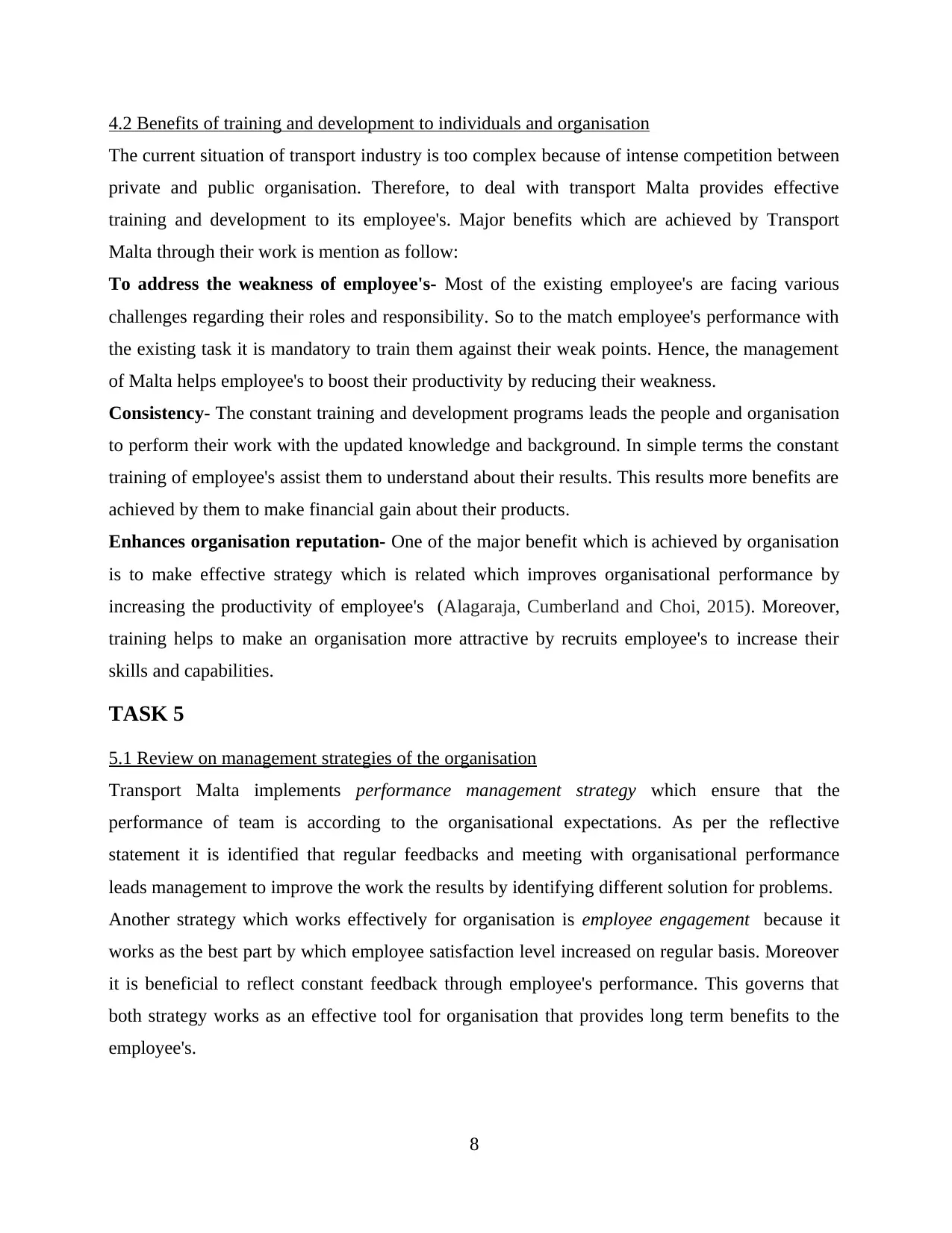
4.2 Benefits of training and development to individuals and organisation
The current situation of transport industry is too complex because of intense competition between
private and public organisation. Therefore, to deal with transport Malta provides effective
training and development to its employee's. Major benefits which are achieved by Transport
Malta through their work is mention as follow:
To address the weakness of employee's- Most of the existing employee's are facing various
challenges regarding their roles and responsibility. So to the match employee's performance with
the existing task it is mandatory to train them against their weak points. Hence, the management
of Malta helps employee's to boost their productivity by reducing their weakness.
Consistency- The constant training and development programs leads the people and organisation
to perform their work with the updated knowledge and background. In simple terms the constant
training of employee's assist them to understand about their results. This results more benefits are
achieved by them to make financial gain about their products.
Enhances organisation reputation- One of the major benefit which is achieved by organisation
is to make effective strategy which is related which improves organisational performance by
increasing the productivity of employee's (Alagaraja, Cumberland and Choi, 2015). Moreover,
training helps to make an organisation more attractive by recruits employee's to increase their
skills and capabilities.
TASK 5
5.1 Review on management strategies of the organisation
Transport Malta implements performance management strategy which ensure that the
performance of team is according to the organisational expectations. As per the reflective
statement it is identified that regular feedbacks and meeting with organisational performance
leads management to improve the work the results by identifying different solution for problems.
Another strategy which works effectively for organisation is employee engagement because it
works as the best part by which employee satisfaction level increased on regular basis. Moreover
it is beneficial to reflect constant feedback through employee's performance. This governs that
both strategy works as an effective tool for organisation that provides long term benefits to the
employee's.
8
The current situation of transport industry is too complex because of intense competition between
private and public organisation. Therefore, to deal with transport Malta provides effective
training and development to its employee's. Major benefits which are achieved by Transport
Malta through their work is mention as follow:
To address the weakness of employee's- Most of the existing employee's are facing various
challenges regarding their roles and responsibility. So to the match employee's performance with
the existing task it is mandatory to train them against their weak points. Hence, the management
of Malta helps employee's to boost their productivity by reducing their weakness.
Consistency- The constant training and development programs leads the people and organisation
to perform their work with the updated knowledge and background. In simple terms the constant
training of employee's assist them to understand about their results. This results more benefits are
achieved by them to make financial gain about their products.
Enhances organisation reputation- One of the major benefit which is achieved by organisation
is to make effective strategy which is related which improves organisational performance by
increasing the productivity of employee's (Alagaraja, Cumberland and Choi, 2015). Moreover,
training helps to make an organisation more attractive by recruits employee's to increase their
skills and capabilities.
TASK 5
5.1 Review on management strategies of the organisation
Transport Malta implements performance management strategy which ensure that the
performance of team is according to the organisational expectations. As per the reflective
statement it is identified that regular feedbacks and meeting with organisational performance
leads management to improve the work the results by identifying different solution for problems.
Another strategy which works effectively for organisation is employee engagement because it
works as the best part by which employee satisfaction level increased on regular basis. Moreover
it is beneficial to reflect constant feedback through employee's performance. This governs that
both strategy works as an effective tool for organisation that provides long term benefits to the
employee's.
8
Paraphrase This Document
Need a fresh take? Get an instant paraphrase of this document with our AI Paraphraser
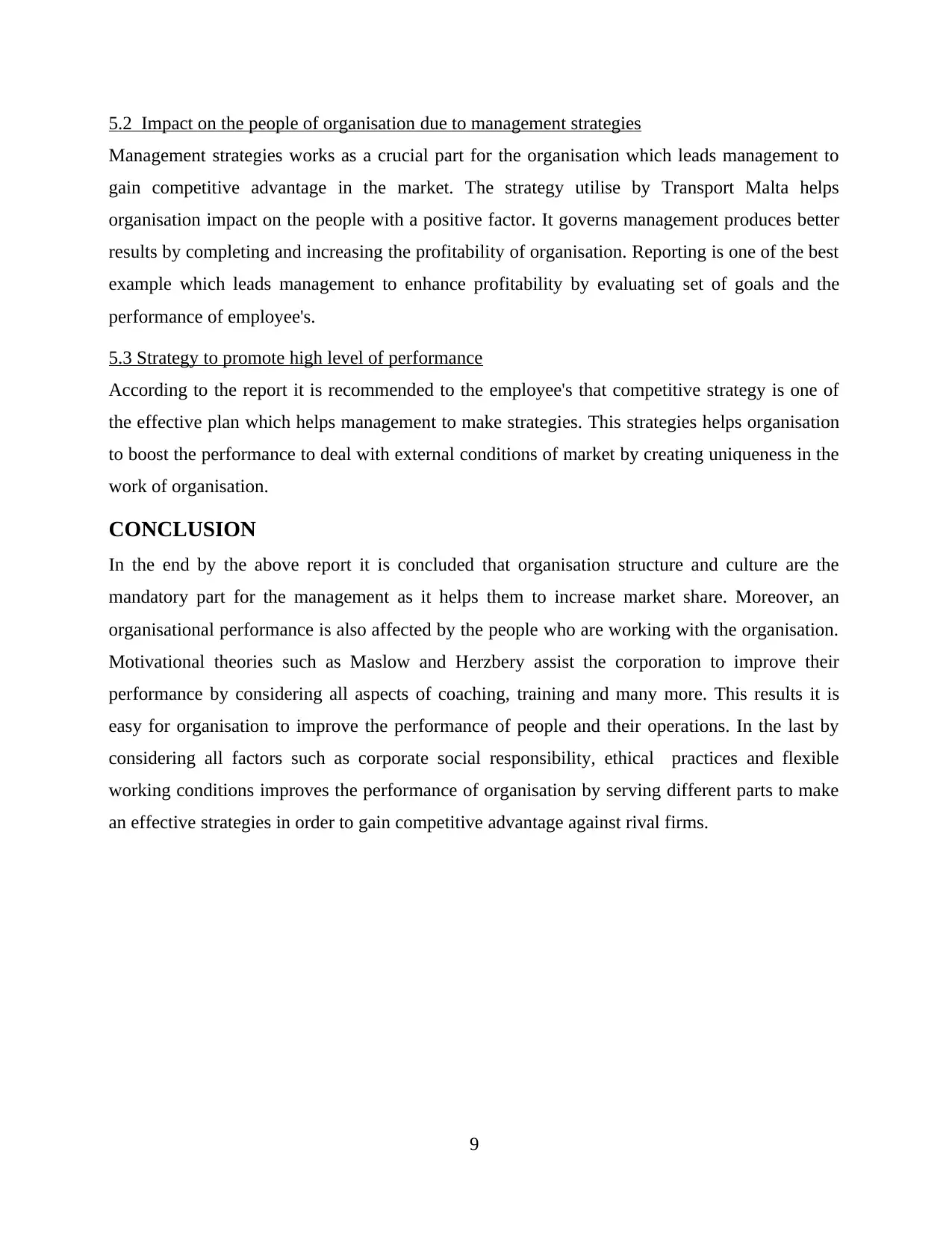
5.2 Impact on the people of organisation due to management strategies
Management strategies works as a crucial part for the organisation which leads management to
gain competitive advantage in the market. The strategy utilise by Transport Malta helps
organisation impact on the people with a positive factor. It governs management produces better
results by completing and increasing the profitability of organisation. Reporting is one of the best
example which leads management to enhance profitability by evaluating set of goals and the
performance of employee's.
5.3 Strategy to promote high level of performance
According to the report it is recommended to the employee's that competitive strategy is one of
the effective plan which helps management to make strategies. This strategies helps organisation
to boost the performance to deal with external conditions of market by creating uniqueness in the
work of organisation.
CONCLUSION
In the end by the above report it is concluded that organisation structure and culture are the
mandatory part for the management as it helps them to increase market share. Moreover, an
organisational performance is also affected by the people who are working with the organisation.
Motivational theories such as Maslow and Herzbery assist the corporation to improve their
performance by considering all aspects of coaching, training and many more. This results it is
easy for organisation to improve the performance of people and their operations. In the last by
considering all factors such as corporate social responsibility, ethical practices and flexible
working conditions improves the performance of organisation by serving different parts to make
an effective strategies in order to gain competitive advantage against rival firms.
9
Management strategies works as a crucial part for the organisation which leads management to
gain competitive advantage in the market. The strategy utilise by Transport Malta helps
organisation impact on the people with a positive factor. It governs management produces better
results by completing and increasing the profitability of organisation. Reporting is one of the best
example which leads management to enhance profitability by evaluating set of goals and the
performance of employee's.
5.3 Strategy to promote high level of performance
According to the report it is recommended to the employee's that competitive strategy is one of
the effective plan which helps management to make strategies. This strategies helps organisation
to boost the performance to deal with external conditions of market by creating uniqueness in the
work of organisation.
CONCLUSION
In the end by the above report it is concluded that organisation structure and culture are the
mandatory part for the management as it helps them to increase market share. Moreover, an
organisational performance is also affected by the people who are working with the organisation.
Motivational theories such as Maslow and Herzbery assist the corporation to improve their
performance by considering all aspects of coaching, training and many more. This results it is
easy for organisation to improve the performance of people and their operations. In the last by
considering all factors such as corporate social responsibility, ethical practices and flexible
working conditions improves the performance of organisation by serving different parts to make
an effective strategies in order to gain competitive advantage against rival firms.
9
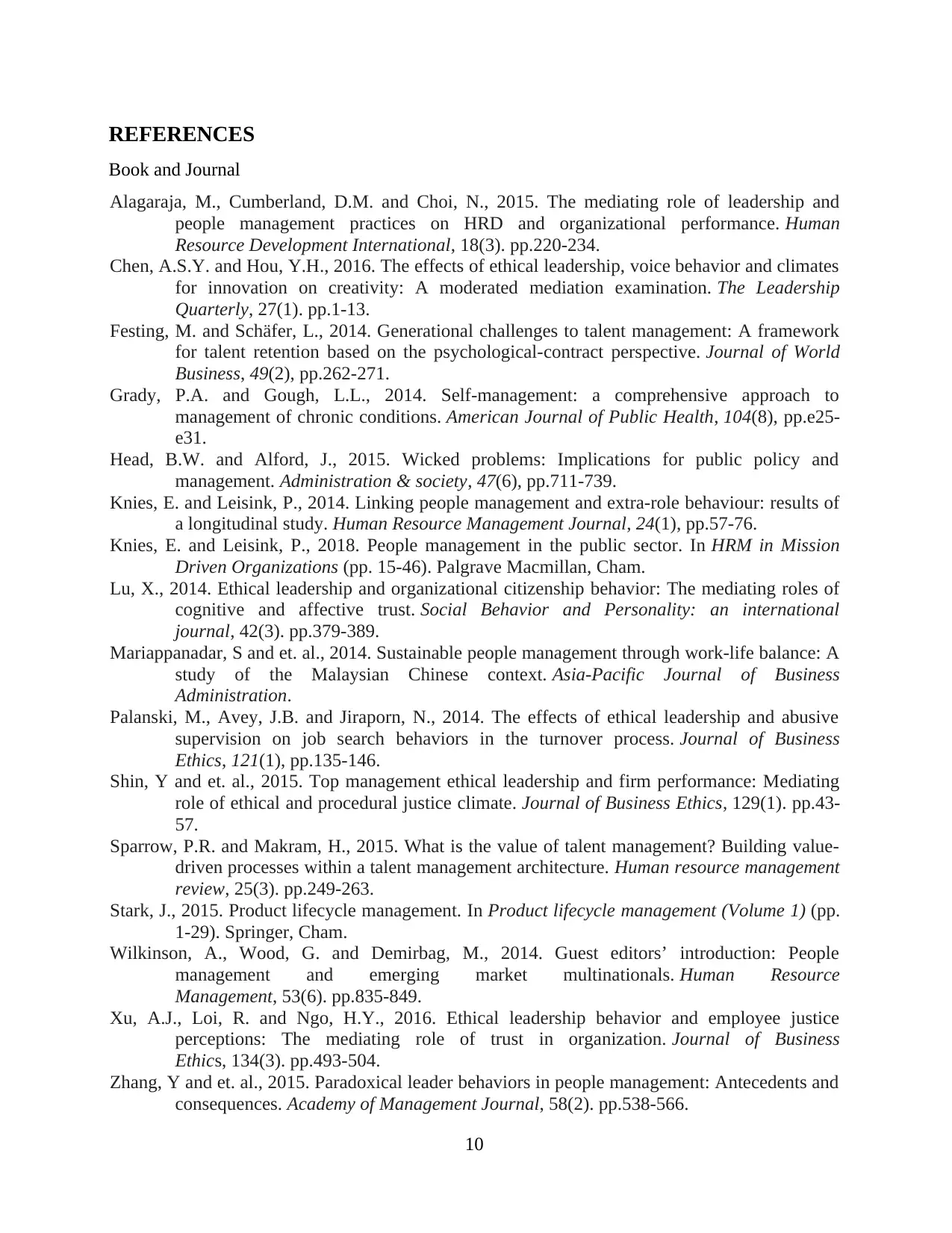
REFERENCES
Book and Journal
Alagaraja, M., Cumberland, D.M. and Choi, N., 2015. The mediating role of leadership and
people management practices on HRD and organizational performance. Human
Resource Development International, 18(3). pp.220-234.
Chen, A.S.Y. and Hou, Y.H., 2016. The effects of ethical leadership, voice behavior and climates
for innovation on creativity: A moderated mediation examination. The Leadership
Quarterly, 27(1). pp.1-13.
Festing, M. and Schäfer, L., 2014. Generational challenges to talent management: A framework
for talent retention based on the psychological-contract perspective. Journal of World
Business, 49(2), pp.262-271.
Grady, P.A. and Gough, L.L., 2014. Self-management: a comprehensive approach to
management of chronic conditions. American Journal of Public Health, 104(8), pp.e25-
e31.
Head, B.W. and Alford, J., 2015. Wicked problems: Implications for public policy and
management. Administration & society, 47(6), pp.711-739.
Knies, E. and Leisink, P., 2014. Linking people management and extra‐role behaviour: results of
a longitudinal study. Human Resource Management Journal, 24(1), pp.57-76.
Knies, E. and Leisink, P., 2018. People management in the public sector. In HRM in Mission
Driven Organizations (pp. 15-46). Palgrave Macmillan, Cham.
Lu, X., 2014. Ethical leadership and organizational citizenship behavior: The mediating roles of
cognitive and affective trust. Social Behavior and Personality: an international
journal, 42(3). pp.379-389.
Mariappanadar, S and et. al., 2014. Sustainable people management through work-life balance: A
study of the Malaysian Chinese context. Asia-Pacific Journal of Business
Administration.
Palanski, M., Avey, J.B. and Jiraporn, N., 2014. The effects of ethical leadership and abusive
supervision on job search behaviors in the turnover process. Journal of Business
Ethics, 121(1), pp.135-146.
Shin, Y and et. al., 2015. Top management ethical leadership and firm performance: Mediating
role of ethical and procedural justice climate. Journal of Business Ethics, 129(1). pp.43-
57.
Sparrow, P.R. and Makram, H., 2015. What is the value of talent management? Building value-
driven processes within a talent management architecture. Human resource management
review, 25(3). pp.249-263.
Stark, J., 2015. Product lifecycle management. In Product lifecycle management (Volume 1) (pp.
1-29). Springer, Cham.
Wilkinson, A., Wood, G. and Demirbag, M., 2014. Guest editors’ introduction: People
management and emerging market multinationals. Human Resource
Management, 53(6). pp.835-849.
Xu, A.J., Loi, R. and Ngo, H.Y., 2016. Ethical leadership behavior and employee justice
perceptions: The mediating role of trust in organization. Journal of Business
Ethics, 134(3). pp.493-504.
Zhang, Y and et. al., 2015. Paradoxical leader behaviors in people management: Antecedents and
consequences. Academy of Management Journal, 58(2). pp.538-566.
10
Book and Journal
Alagaraja, M., Cumberland, D.M. and Choi, N., 2015. The mediating role of leadership and
people management practices on HRD and organizational performance. Human
Resource Development International, 18(3). pp.220-234.
Chen, A.S.Y. and Hou, Y.H., 2016. The effects of ethical leadership, voice behavior and climates
for innovation on creativity: A moderated mediation examination. The Leadership
Quarterly, 27(1). pp.1-13.
Festing, M. and Schäfer, L., 2014. Generational challenges to talent management: A framework
for talent retention based on the psychological-contract perspective. Journal of World
Business, 49(2), pp.262-271.
Grady, P.A. and Gough, L.L., 2014. Self-management: a comprehensive approach to
management of chronic conditions. American Journal of Public Health, 104(8), pp.e25-
e31.
Head, B.W. and Alford, J., 2015. Wicked problems: Implications for public policy and
management. Administration & society, 47(6), pp.711-739.
Knies, E. and Leisink, P., 2014. Linking people management and extra‐role behaviour: results of
a longitudinal study. Human Resource Management Journal, 24(1), pp.57-76.
Knies, E. and Leisink, P., 2018. People management in the public sector. In HRM in Mission
Driven Organizations (pp. 15-46). Palgrave Macmillan, Cham.
Lu, X., 2014. Ethical leadership and organizational citizenship behavior: The mediating roles of
cognitive and affective trust. Social Behavior and Personality: an international
journal, 42(3). pp.379-389.
Mariappanadar, S and et. al., 2014. Sustainable people management through work-life balance: A
study of the Malaysian Chinese context. Asia-Pacific Journal of Business
Administration.
Palanski, M., Avey, J.B. and Jiraporn, N., 2014. The effects of ethical leadership and abusive
supervision on job search behaviors in the turnover process. Journal of Business
Ethics, 121(1), pp.135-146.
Shin, Y and et. al., 2015. Top management ethical leadership and firm performance: Mediating
role of ethical and procedural justice climate. Journal of Business Ethics, 129(1). pp.43-
57.
Sparrow, P.R. and Makram, H., 2015. What is the value of talent management? Building value-
driven processes within a talent management architecture. Human resource management
review, 25(3). pp.249-263.
Stark, J., 2015. Product lifecycle management. In Product lifecycle management (Volume 1) (pp.
1-29). Springer, Cham.
Wilkinson, A., Wood, G. and Demirbag, M., 2014. Guest editors’ introduction: People
management and emerging market multinationals. Human Resource
Management, 53(6). pp.835-849.
Xu, A.J., Loi, R. and Ngo, H.Y., 2016. Ethical leadership behavior and employee justice
perceptions: The mediating role of trust in organization. Journal of Business
Ethics, 134(3). pp.493-504.
Zhang, Y and et. al., 2015. Paradoxical leader behaviors in people management: Antecedents and
consequences. Academy of Management Journal, 58(2). pp.538-566.
10
⊘ This is a preview!⊘
Do you want full access?
Subscribe today to unlock all pages.

Trusted by 1+ million students worldwide
1 out of 13
Related Documents
Your All-in-One AI-Powered Toolkit for Academic Success.
+13062052269
info@desklib.com
Available 24*7 on WhatsApp / Email
![[object Object]](/_next/static/media/star-bottom.7253800d.svg)
Unlock your academic potential
Copyright © 2020–2026 A2Z Services. All Rights Reserved. Developed and managed by ZUCOL.




